Paterson: Density, Destiny, and the Fighting Family of Eddie Cotton
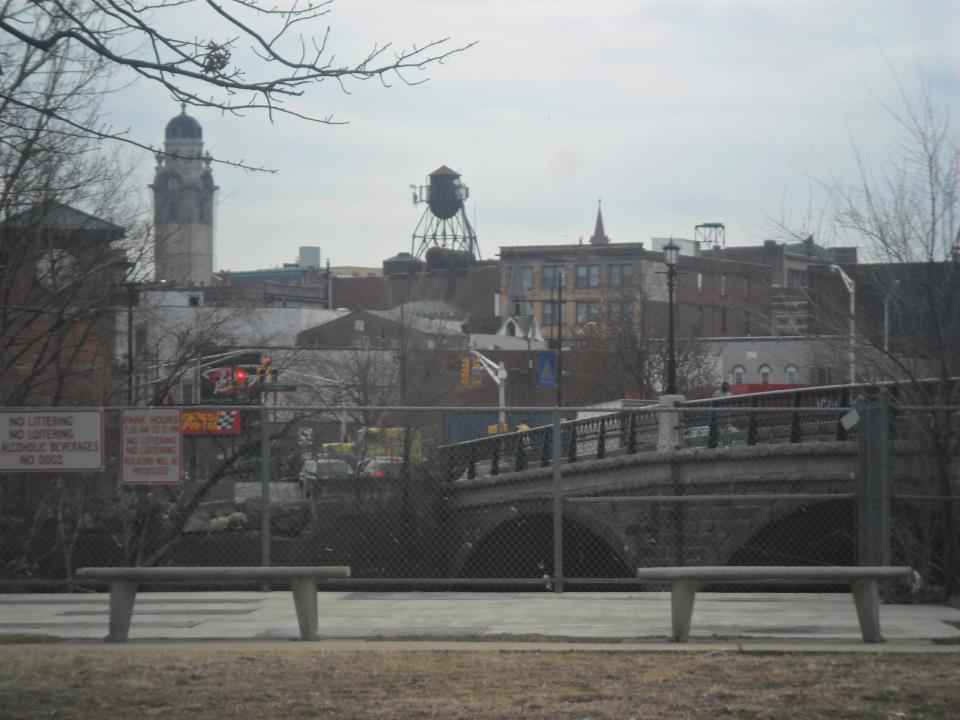
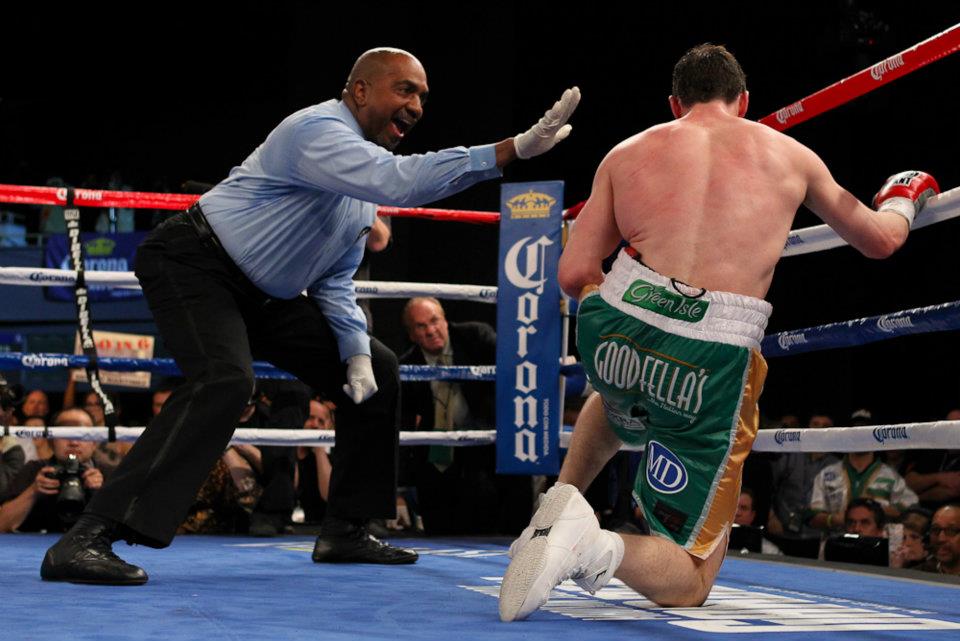
If the city was a family, the death of Eddie Cotton of Paterson from the virus made people again aware of their interconnectedness in a particularly painful and devastating way, reminding them of the hazards of building a close-knit community of high density, conditions ready made for the spread of COVID-19.
In a city struggling since the aftermath of the industrial revolution, Ed Cotton cut a patriarchal figure, an example not only of personal excellence attained on the world stage as the referee of heavyweight prizefights, but as the pioneering former first black council president and Department of Public Works director: an unassailable black male force who demonstrated to men of all ages in his personal demeanor and life record the virtues of strength and wisdom.
“An amazing, iconic renaissance man,” said At-Large Councilwoman Lilisa Mimms. “We will never forget Ed Cotton.”
As the husband of sitting Councilwoman Ruby Cotton, he was that life partner who would go to the
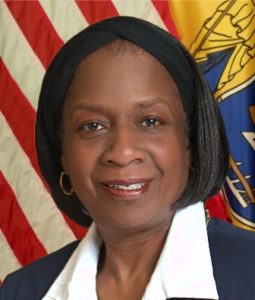
council chamber to back his wife in tough political weather. “I don’t see you anymore,” he joked once at the microphone, as he reflected on the perpetual motion of her public service. If you were young and in trouble, he was the man who might be there with an encouraging word, instructions about life, or more – money or a school or coaching contact, and a hard and kind directive to get into a classroom, a gym, or onto a field; a presence who reminded you of the power of Paterson’s uniquely world-rooted family.
In a state of parochial towns and cities, Paterson – without ever saying it outright – prized itself on gentility that came not from naivete, but its exact opposite: worldliness gained not only from tough urban conditions (high crime, high unemployment), but mostly from the close proximity of more ethnic groups packed into a small space than anywhere else in New Jersey.
People figured out how to mostly get along, thanks to the enduring example of people like Ed Cotton.
And now, in addition to the usual hazards weighing on the strong core of the community, people were dying every day of COVID-19.
An aunt. The aunt of your wife. The mother of a friend in a long-term care facility. A bus driver. A woman you didn’t know in a gurney getting carried across a sidewalk to the ambulance. The parishioner of the church you went to with a friend. Someone’s father. Someone’s brother. Someone’s grandfather. Someone’s sister, or mother. Every 24 hours, it encroached closer, and when Ed Cotton went down Friday morning to the virus, the city had to absorb the absence of someone perceived to be among the strongest, and had to look at itself again, for all its jagged edges, with a renewed awful sense of its own inherent vulnerabilities.
It was not only a dirge of doom.
On Palm Sunday, Mayor Andre Sayegh stood in the street outside St. Joseph’s Regional Medical Center to celebrate the service of the facility’s medical staff. “We are stronger than COVID-19,” Sayegh declared, waving through a window at 20-year emergency room veteran Dr. James Pruden, who had been on a ventilator as he fought the virus. Now he was well enough to stand and wave back.
“He is watching us, just as God is watching us as well on Palm Sunday,” Sayegh said of Pruden. “He is the symbol of strength in our city right now.”
The ER doctor subsequently went home from the hospital that saved him but also needs him.
Yet on the same week, the mayor himself announced he had tested positive for COVID-19, and – in a city used to seeing the political leader in the streets – fell back to quarantine at home.
“I encourage all Patersonians to take this disease seriously and stay at home when possible,” Sayegh said. “Even with all my careful efforts of social distancing for the last month – keeping six feet away from all individuals, vigorously practicing good hand hygiene, and even over the last week, wearing a mask in public – I have fallen prey to this virus. But I am a fighter and will continue to do my job on behalf of the City of Paterson.”
Then, amid another round of deaths, Paterson learned that Eddie Cotton was on a ventilator in the hospital, and hours later, found out he had died.
PATERSON: ‘FORMULA FOR PANDEMIC DIASTER’
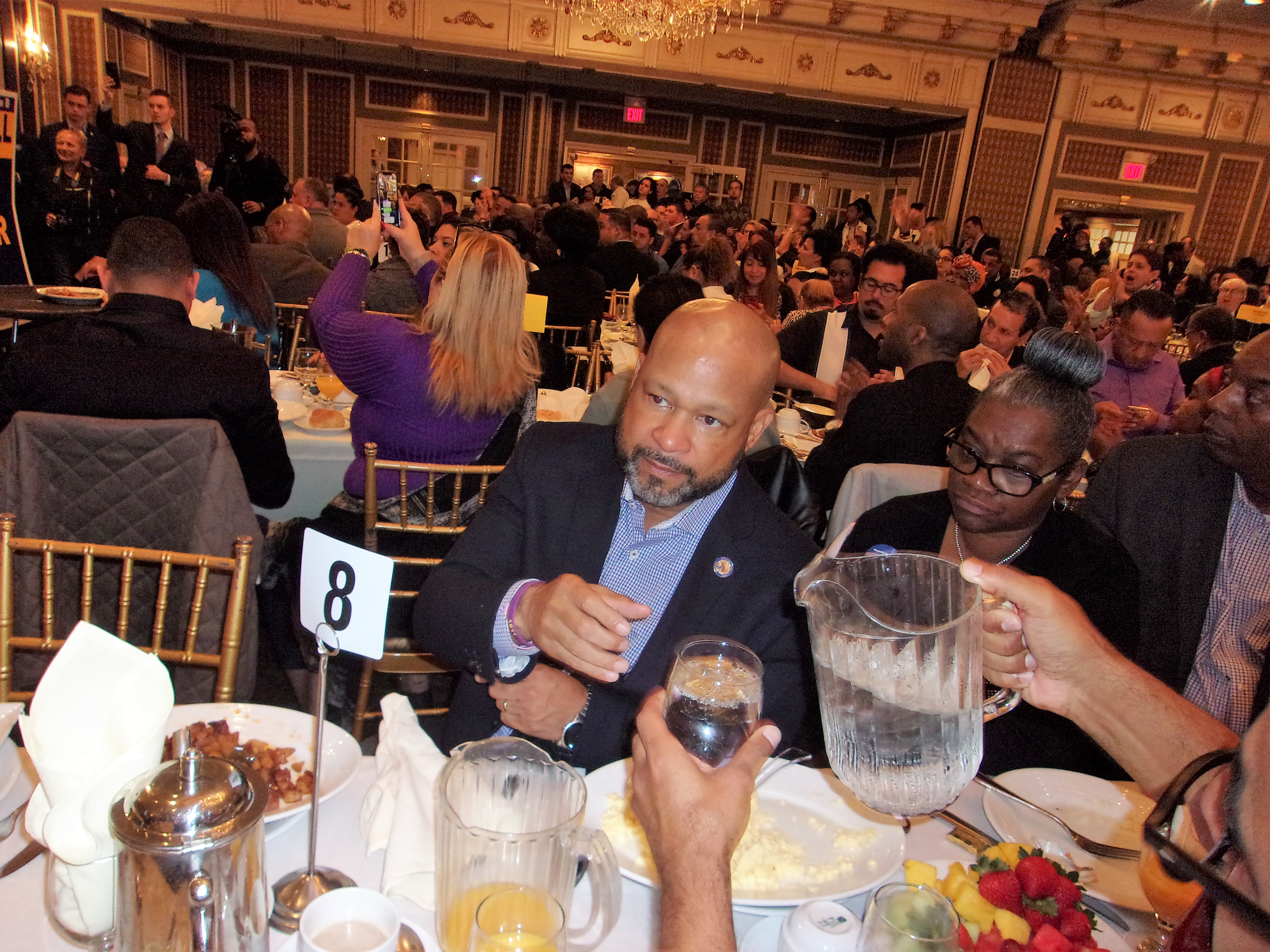
“He was always there for personal, go-to family matters,” said Assemblyman Benji Wimberly (D-35), Ed Cotton’s first cousin and head of the city Department of Recreation.
The high school coach of football wide receiver Victor Cruz, who went on to be a Super Bowl champion, Wimberly grew up admiring leaders like Cotton, men who in difficult circumstances imposed sports structures to stem Paterson’s worst influences, and masked behind strong exteriors the pains of life in an old factory town, where too many suffered underlying respiratory conditions. “When you look at Paterson,” said the grieving Wimberly, “the fact that you have at least 150,000 people living in 8.5 square miles, the culture of drug and alcohol abuse, a high asthma and tuberculosis rate, you put that together with coronavirus, and it’s a formula for pandemic disaster.”
“If you’re in a minority community such as ours, you have present a lot of preexisting conditions and general lack of access to healthcare,” said 3rd Ward Councilman Bill McKoy.
People also live in the streets, and find it especially hard to stay inside.
Multiple sources describe residents in defiance or ignorant neglect of Governor Phil Murphy’s shutdown order, congregating outside liquor stores and the ongoing run of drug deals on Broadway ancillary streets. 17th Avenue and 28th Street is supposedly heavily trafficked. Police Director Jerry Speziale established COVID-19 compliance units, which in two weeks issued 256 virus patrol tickets and 478 warnings: 180 summonses for blocking public passageways, 21 for loitering in front of businesses, 14 for failing to promoting social distancing, and four summonses to people congregating in parks. On Sunday, cops broke up a dirtbike-riding confab in Eastside Park.
“There are folks who need to get the message who are not getting the message,” Wimberly said.
But more than what some people in the city continue to do wrong is the reality of a place where residents are desperate to do what’s right and are unprepared – almost by definition – for this scourge in a city where, as of Sunday, 2,812 residents have tested positive and 64 have died, according to Paterson’s COVID-19 tracker.
“The biggest example of why we’re struggling with COVID is that Paterson has just one hospital [St.
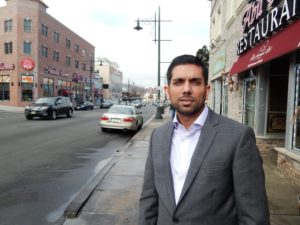
Joseph’s] for the third largest city in the state,” said Passaic County Freeholder (and Patersonian) Assad Akhter. “This is a city that lacks infrastructural decisions that needed to have been made ten years ago, where two hospitals have closed over the same period of time, in a county which only has three hospitals. On top of that, Paterson like Newark and Jersey is taking a harder hit because these are communities, given the size of populations and density, where it is harder to socially distance. These are residents who have higher rates of obesity and underlying health issues – and fewer resources.” A single drive-by testing site in the county in Wayne means many Patersonians cannot get access to tests.
The strain on the frontline is obvious.
Dr. Pruden lived. But 34-year old Officer Frank Scorpo did not.
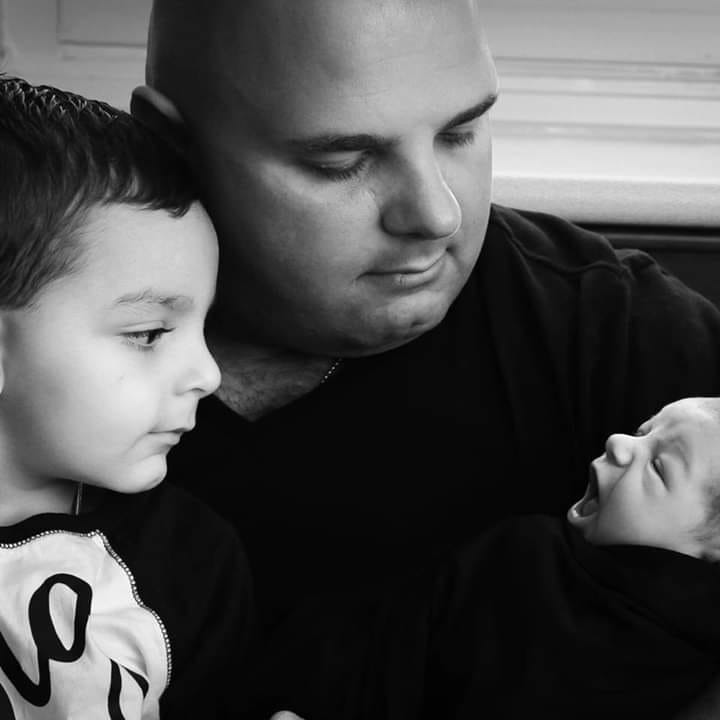
A city police officer and married father of two sons, Officer Scorpo fell to COVID-19 last week, causing anguish statewide, and creating questions about the appropriateness of law enforcement personnel as a first line defense against an unseen virus. “It’s just crazy when it impacts public sector workers,” said Assemblywoman Shavonda Sumter (D-35). “We have people who are trying to do good but not knowing what coronavirus can do. Even as we really try to get the message to our folks about what we can do, we are still trying to get control of an invisible agent.” For Wimberly, Paterson cannot police its way out of the crisis. Said the assemblyman, “I would definitely favor bringing in the National Guard at this point,” not to patrol primarily but to take test kits to residents bound in senior high-rises and, conceivably, to augment St. Joe’s with field hospitals.

“We need to be more aggressive with the needs testing for all our residents in senior housing,” concurred Council President Maritza Davila.
Then what?
The city still only has one hospital.
“You can put beds out and you can buy tests,” said Akhter. “The problem is you need to have human resources with training and the equipment, which is incredibly hard to find.”
The city also lacks morgue capacity.
Governor Murphy in recent days signed executive orders to recruit out of state and out of country physicians and nurses, and to enable back into first responder units those emergency medical technicians (EMTs) with lapsed certifications.
But in terms of realigning a combat strategy behind the basics at this point, “We have to be careful,” said Akhter. “You make one problem better and another problem worse. We don’t have a drive-through testing site, for example, and so Paterson has considered a walk-up site. But the Department of Health won’t allow a walk-up site because they don’t want people congregating.
“I’m not opposed to the National Guard coming in, but you have to define the strategy and the goal,” the freeholder added. “They have to have an achievable goal.”
Wimberly confessed that short of a more aggressive, greatly augmented go-to-people-where-they-live policy, Paterson will find seniors on the other side of the worst of this pandemic, dead in their high-rises.
Running for reelection in the city’s first all-vote-by-mail contest scheduled for May 12th, First Ward
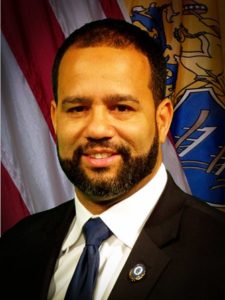
Councilman Mike Jackson, himself a former professional athlete and small business owner and very street-visible presence, also worries about Paterson’s foothold in this unprecedented crisis.
“First and foremost we need our senior buildings taken care of,” Jackson told InsiderNJ. “If they can’t get out – and they can’t – we need care providers to go to them with testing. Also, they need personal items. We’re asking people to quarantine but leaving them to handle their own endeavors. Our medical outlets are taxed, which means those rendering locally need extra funding – people like social worker Doctor Mary Garner [of the Paterson Community Health Center].
“Paterson is always treated like this welfare center by the state, but the reality is we are underpaid, overworked employees of the state here and we need those resources,” Jackson added. “People are afraid.”
They have reason to be.
UNDER SIEGE
City Health Officer Paul Persaud and his strike team also stand on the frontline of the crisis.
“What we need to do is abide by the message every kid in this country knows about social distancing and washing one’s hands,” the trained epidemiologist told InsiderNJ on Saturday afternoon.
“People are dying because of Paterson’s density – sometimes as many as eight people living in a small apartment – and because of underlying conditions that people suffer,” Persaud said. “These things are going to happen in Newark, Jersey City and Paterson.
“What we’ve noticed is a lot of people not having symptoms,” Persaud added. “It is a very deceptive virus. But people with asthma, respiratory conditions and obesity – that is where it is causing a major problem.”
And those, again, are widespread problems in Paterson, even when people cover up and tough through the literal chokehold of something like asthma, which was there before, worse now.
Persaud said his citywide team, which he expanded to 25 people in the lead up to the crisis, incorporate the most cutting edge contact tracing methods, which combine alerting people about who has the virus, supporting quarantines, and using digital tools.
They’re under siege.
But Persaud insists they are up to the job.
“The most important thing right now is that people abide by those social distancing, quarantining and stay-at-home measures,” said the health officer, who repeatedly in a conversation conceded the deeper challenge in a densely populated city where residents routinely live crammed together in small apartments; where a mid-March charity event for children may have exposed key people in government.
MCKOY VERSUS MENDEZ: A PATERSON FRONTLINE OF ANOTHER KIND
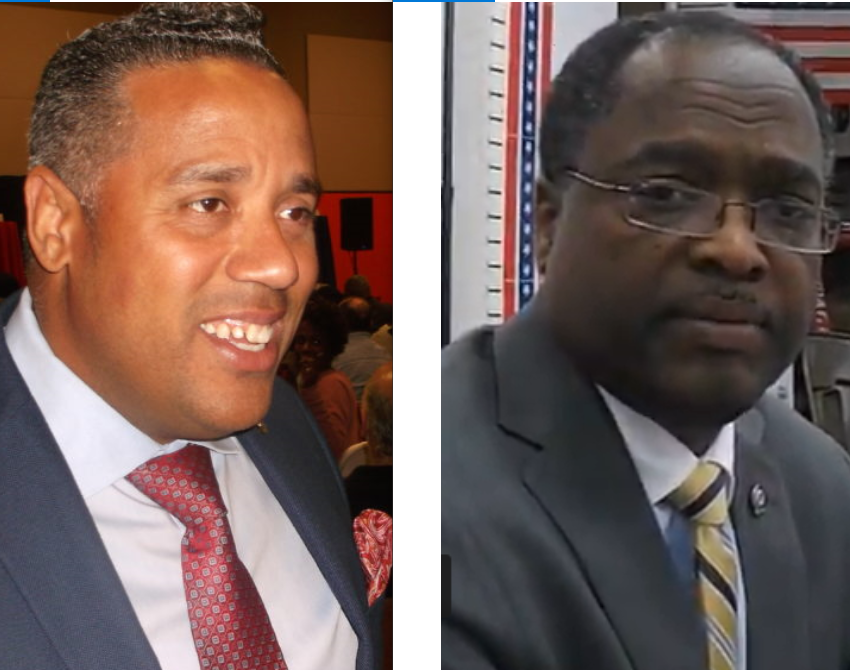
Paterson’s diversity and density have long made it one of the state’s prime local political battlegrounds: the scene of Jamaican backyard barbecues and Dominican rallies in campaign headquarters where people spill through doors onto sidewalks in the name of overflow campaigns.
In the middle of the COVID-19 calamity, the city’s May 12th Election Day features a collision in the 3rd Ward between a pair of rivals who survived the 2018 mayoral demolition derby. Alex Mendez had to give up his at-large seat to run that year, placing a distant second with 21% behind 6th Ward Councilman Andre Sayegh (41%), while Councilman Bill McKoy ran without having to relinquish his third ward perch. He placed a disappointing fourth citywide with 12% of the vote.
Now Mendez wants back in with a ward-wide win, which presumably would set him up with another crack at Sayegh in 2022, and can only get there through McKoy.
The virus has a stranglehold on a conventional contest this year.
Mendez’s wife’s uncle died from COVID-19 complications.
“A lot of people are dying,” he said. “We are not practicing enough social distancing and there’s not enough testing. Even today I received a lot of phone calls from people saying the William Paterson testing center [in Wayne] is closed. A lot of people who are sick are staying home with other members of their family getting contaminated. There is a lot of concern in the senior community. Seniors are afraid of getting on the elevators.”
Campaigning usually consists of rallies and door pounding.
Now they’re giving out facemasks, gloves and hand sanitizer and educating the community through social media. “We are just assisting the community,” Mendez said. “The city is really struggling right now. The phone calls we are making are to find out how people are.”
For his part, McKoy – who attended the Mustard Seed March 14th fundraiser – has tried to work from home as much as he can with his family.
Death has come to the neighborhood.
A friend who lived two houses away, proud lifelong Patersonian and celebrated opera tenor Edward Perretti, succumbed to the virus on April 15th.
He was another irrepressible athlete.
From his obituary:
As if leading dual careers in education and performance were not enough, Ed served as a sports official for decades. It was not unusual to find him umpiring a baseball or football game in the morning and singing Pagliacci in the evening, all with the same enthusiasm and dedication which defined his life.
“We have seen a lot of impact in the community,” McKoy told InsiderNJ. “It has been devastating.”
At the very least, he wants broader testing access for city employees, beyond police and fire. “We need all people tested at City Hall, now that mayor has tested positive,” McKoy said.
Numerous people, including Jackson and McKoy, mentioned in particular the need for relief at the city clerk’s office. The 3rd Ward councilman also wants a greater range of tests for the city. “There are a number of people at home who presumably have the virus and can’t get tested,”” the councilman said. “Testing is the one thing that would allow us to identify where those positive cases lie.”
He’s also alert to the longer-term economic impact of the virus. Home to a large undocumented worker population, Paterson will not receive the household to household federal stimulus to sustain itself through the ongoing shutdown and the aftermath. It already suffers a high unemployment rate.
As for the immediate challenge of an all-VBM election, McKoy admitted, the virus “has turned this race on its head. The campaign is unique and totally upended.”
An intellectual and numbers-driven accountant who trusted in his ability to dissect his ebullient people-person opponent on stage, McKoy must compete this time without the advantage of a debate.
Fundraising?
“I had something scheduled for this week that didn’t get off the ground,” he said with a grim laugh. “I spent a lot of money organizing. I got my campaign headquarters opened up in February, and closed it in March. Campaigning, of course, has gone out the window.”
Mendez has an apparent leg up with a VBM strategy that long propelled his campaigns.
McKoy, though, refuses to concede the point.
There are too many other variables.
“Yet to be seen,” the incumbent councilman said. “All registered voters will receive a ballot and will have an opportunity to vote – and to maintain the integrity of their ballots.
“Unscrupulous interference will not be tolerated,” he added, a nod to past well documented VBM malfeasance in the city.
The lack of a debate – always a McKoy strength – nags at him.
“Seniors would have had an opportunity to see the candidates and now that platform is gone, and what you’re left with is direct mail,” he said. “But I am well known and I think I have an outstanding record and broad-based support. Paterson has always been a tough town, with a history of coming through fires and floods and different upheavals.
“This is somewhat different,” he acknowledged. “We’re seeing a global pandemic. It’s hitting the world, and in some ways it hits us even harder. It’s very personal.
“We just lost the spouse of a councilperson,” McKoy said, a reference to Eddie Cotton. “We are a tough community. We have seen trouble before and we look to our faith. This too will pass, as we observe lessons learned from life and family and not sweating the small stuff, as we work together in common cause, common humanity, and shared destiny.”
A DESPERATE CHANCE AT CHANGE

The concentration of COVID-19 at the city’s only hospital, where one of the facility’s chief doctors himself went down, gives sick people pause before going to the emergency room. If the person doesn’t have coronavirus going in, won’t he or she surely have it on the other side of a hospital visit?
And if a person does go in, he or she will go in alone, and without the bedside companionship and loving, reassuring hand hold of a family member.
Former Mayor Jeff Jones last week lost his mother, Annie Jones.
She went to the hospital and never came home.
“The shock value of losing someone you love is compounded by the coronavirus,” said Jones. “I had been hearing every day, ‘She’s walking, she’s talking.'”
Then he received the phone call.
She was gone.
The family doesn’t know what killed her.
“There’s no chance to see, touch, taste,” said Annie Jones’ son, a U.S. Marine who served a term as mayor. “You go there to the hospital to find out you can’t see her. You’re diligent and dutiful, and the local funeral home pick up the body.”
A few family members went to the cemetery.
Jones looked up in the haze and saw a mother with a facemask on, carrying a toddler who was uncovered, as he buried his mother.
“You can’t mourn in a dead zone,” said Jones. “It’s injury upon injury upon injury.”
He sees an abdication of leadership at all layers of government, social media proficiency in place of good government, and problems – injustices – unaddressed, now back with a vengeance.
And yet, through his grief, and in the slog of loss, still in shock after burying his mom, Jones said the country must pay attention. “If this is what it is required to let the world know that we are not prepared, our healthcare system is not prepared, then let’s test the system while we can, let’s make the makeshift hospitals and National Guard presence if need be, sure, and the straining lone hosptial in town, and what to this point has been a criminal lack of testing opportunities for people, seniors, as the basis for how we remake our healthcare system for people.
“Let this be our defining moment,” said Jones.
UNDERGROUND

The city goes on as elsewhere, with remote Bible studies relentless in a lockdown. Music blares out of backyards. Children without computers try to find a way to survive outside the classroom.
“I prefer to call it physical distancing instead of social distancing,” said Assemblywoman Sumter, who refuses to lose hold of the organizing Paterson principal of soulful closeness.
“Language matters,” she said.
She’s mournful, frustrated.
“Every time you think you’ve got it, you don’t – quite,” Sumter said. “This is a smart disease. It’s just critical for us, for our highly populated city – to keep physical distancing.”
She considered the inevitable in this place that was already in fighting mode prior to the virus. “We are going to hit a pinnacle of poverty,” she said. “It’s sad, because I believe we were seeing some light finally. We were getting some start to our engine.”
In his basement, the mayor mourned his friend, the husband of his council colleague, the man with whom he watched so many professional prize fights, in addition to watching Eddie Cotton officiate other fights. The words of the old broadcasts haunt, the excited ringside observances of HBO’s Jim Lampley, who in 1996 called Golota Bowe II, which featured third man Eddie Cotton. “Riddick comes to the body. Riddick Bowe, fighting with a nothing to lose attitude now. He was almost gone on this evening, but now he’s back in it big time. And Golota stumbles.”
Somewhere in a broad land of pre-set social and physical distancing, people clamor for park openings or give the governor an earful because they can’t play golf, or argue for opening the world up and letting the country fend for itself, armed, they say, with the providential primary source of the United States Constitution, Murphy told reporters at a press briefing in the War Memorial on Saturday. Crunched together between mountains under a highway, its lone hospital crushed, Paterson lives another existence, beset by the same casualties as elsewhere, but unable to ever shake the condition-of being closer than most, the 8.5 mile tao of density and destiny.
“This basement has become my makeshift office,” said Sayegh on Sunday. “It’s my bunker and I’ve channeled my inner Winston Churchill. I appreciate the opportunity and honor to serve you, whether it’s in City Hall or in my basement. I feel very proud to be the mayor of the greatest city on the planet. Paterson.”
Another familiar face went down over the weekend, another friend, another member of a family, and someone else, someone unseen or never celebrated, or heard. In one case, “He was my buddy,” Council President Davila said of Gerard Burns, another well known member of Paterson’s political community. “He supported me and my endeavors all the time. He was a worker. A field guy. Always had my back.”
The words of Eddie Cotton came back. “Thank you wife,” he said on the third floor of City Hall. “Anybody that is going to put that kind of commitment into this process – God bless ’em.”
There seemed to be no time between casualties, as they again considered the horror of what might happen in the high-rise buildings if seniors remained cut off, and how much could the city endure, while losing him or her or someone else, someone like Annie Jones or Edward Perretti or Eddie Cotton, or those unknown, connected, to a fighting family called Paterson.
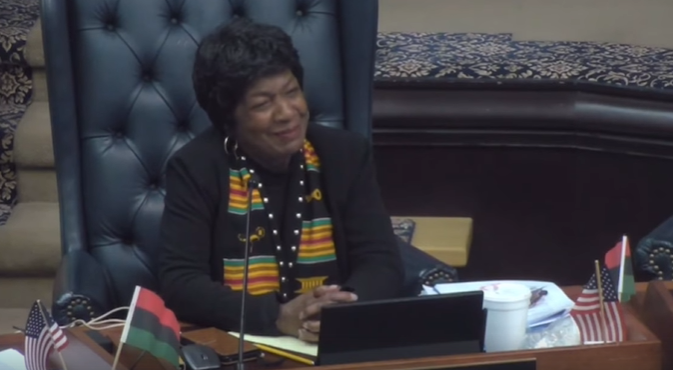








Leave a Reply